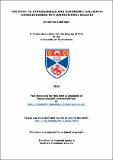Files in this item
The path to ethnogenesis and autonomy : Kallawaya-consciousness in plurinational Bolivia
Item metadata
| dc.contributor.advisor | Harris, Mark | |
| dc.contributor.author | Alderman, Jonathan | |
| dc.coverage.spatial | 364 | en_US |
| dc.date.accessioned | 2016-04-12T09:56:43Z | |
| dc.date.available | 2016-04-12T09:56:43Z | |
| dc.date.issued | 2016-06-23 | |
| dc.identifier | uk.bl.ethos.682795 | |
| dc.identifier.uri | https://hdl.handle.net/10023/8600 | |
| dc.description.abstract | This thesis examines the construction of ethnic identity, autonomy and indigenous citizenship in plurinational Bolivia. In 2009, the Kallawayas, an Andean indigenous nation, took advantage of legislation in Bolivia’s new constitution to begin a process of legally constituting themselves as autonomous from the state. The objective of Indigenous Autonomy in the constitution is to allow indigenous nations and peoples to govern themselves according to their conceptions of ‘Living Well’. Living well, for the Kallawayas is understood in terms of what it means to be runa, a person living in the ayllu (the traditional Andean community). The Kallawayas are noted as healers, and sickness and health is understood as related to the maintenance of a ritual relationship of reciprocity with others in the ayllu, both living humans and ancestors, remembered in the landscape. Joint ritual relations with the landscape play an important role in joining disparate Kallawaya ayllus with distinct traditions and languages (Aymara, Quechua and the Kallawaya language Macha Jujay are spoken) together as an ethnic group. However, Kallawaya politics has followed the trajectory of national peasant politics in recent decades of splitting into federations divided along class and ethnic lines. The joint ritual practices which traditionally connected the Kallawaya ayllus adapted to reflect this new situation of division between three sections of Kallawaya society. This has meant that the Kallawayas are attempting political autonomy as an ethnic group when they have never been more fractured. This thesis then examines the meaning of autonomy and the Good Life for a politically divided and ethnically diverse indigenous people. | en_US |
| dc.language.iso | en | en_US |
| dc.publisher | University of St Andrews | |
| dc.rights | Attribution-NonCommercial-NoDerivatives 4.0 International | * |
| dc.rights.uri | http://creativecommons.org/licenses/by-nc-nd/4.0/ | * |
| dc.subject | Autonomy | en_US |
| dc.subject | Kallawaya | en_US |
| dc.subject | Ethnogenesis | en_US |
| dc.subject | The good life | en_US |
| dc.subject | Vivir bien | en_US |
| dc.subject | Indigenous citizenship | en_US |
| dc.subject.lcc | F3320.2C3A6 | |
| dc.subject.lcsh | Callahuaya Indians--Bolivia--Ethnic identity | en_US |
| dc.subject.lcsh | Bolivia--Autonomy and independence movements | en_US |
| dc.subject.lcsh | Citizenship--Bolivia | en_US |
| dc.title | The path to ethnogenesis and autonomy : Kallawaya-consciousness in plurinational Bolivia | en_US |
| dc.type | Thesis | en_US |
| dc.type.qualificationlevel | Doctoral | en_US |
| dc.type.qualificationname | PhD Doctor of Philosophy | en_US |
| dc.publisher.institution | The University of St Andrews | en_US |
The following licence files are associated with this item:
This item appears in the following Collection(s)
Except where otherwise noted within the work, this item's licence for re-use is described as Attribution-NonCommercial-NoDerivatives 4.0 International
Items in the St Andrews Research Repository are protected by copyright, with all rights reserved, unless otherwise indicated.


